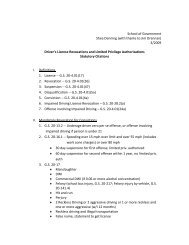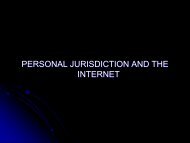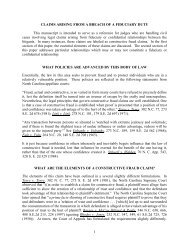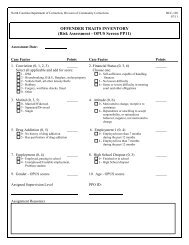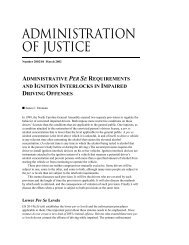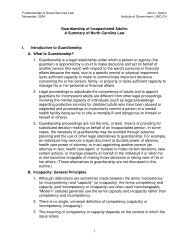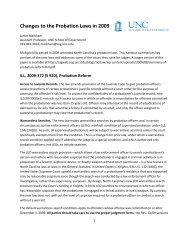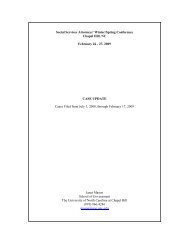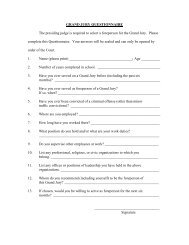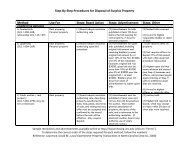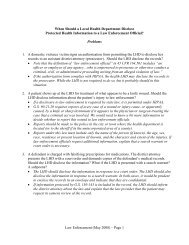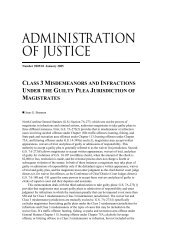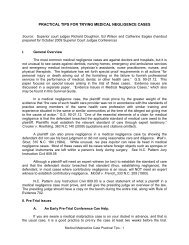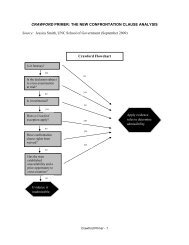Covenants Not to Compete (TROs and Preliminary Injunctions
Covenants Not to Compete (TROs and Preliminary Injunctions
Covenants Not to Compete (TROs and Preliminary Injunctions
Create successful ePaper yourself
Turn your PDF publications into a flip-book with our unique Google optimized e-Paper software.
D. Issuance of preliminary injunction.<br />
1. Similar <strong>to</strong> the order granting the TRO, the order granting the preliminary<br />
injunction shall (1) set forth the reasons for its issuance; (2) shall be specific in<br />
terms; <strong>and</strong> (3) shall describe in reasonable detail, <strong>and</strong> not by reference <strong>to</strong> the<br />
complaint or other document, the act or acts enjoined or restrained. Rule 65(d).<br />
2. Interaction with Rule 52(a)(2). Findings of fact <strong>and</strong> conclusions of law are<br />
necessary on the granting or denying of a preliminary injunction or any other<br />
provisional remedy only when required by statute expressly relating <strong>to</strong> such<br />
remedy or requested by a party. Rule 52(a) (2). Absence a request by a party<br />
that the court make findings of fact <strong>and</strong> conclusions of law, the court is required<br />
<strong>to</strong> state only the reasons for its issuance. See Pruitt v. Williams, 25 N.C. App.<br />
376, 213 S.E.2d 369 (1975).<br />
3. The injunction is binding only upon the parties <strong>to</strong> the action, their officers,<br />
agents, servants, employees <strong>and</strong> at<strong>to</strong>rneys, <strong>and</strong> upon those persons in active<br />
concert or participation with them who receive actual notice in any manner of the<br />
order by personal service or otherwise. Rule 65(d).<br />
4. Security. No restraining order or preliminary injunction shall issue except upn the<br />
giving of security by the applicant, in such term as the judge deems proper,<br />
for the payment of such costs <strong>and</strong> damages as may be incurred or suffered by<br />
any party who is found <strong>to</strong> have been wrongfully enjoined or restrained. Rule<br />
65(c).<br />
The trial court has power not only <strong>to</strong> set the amount of security but <strong>to</strong> dispense<br />
with any security requirement whatsoever where the restraint will do the<br />
defendant no material damage, where there has been no proof of likelihood of<br />
harm <strong>and</strong> where the applicant for equitable relief has considerable assets <strong>and</strong> is<br />
able <strong>to</strong> respond in damages if defendant does suffer damages by reason of a<br />
wrongful injunction. Keith v. Day, 60 N.C. App. 559, 299 S.E.2d 296 (1983)<br />
(quoting Federal Prescription Service, Inc. et al. v. American Pharmaceutical<br />
Assoc., 636 F. 2d 755, 759 (D.C. Cir. 1980)). However, “any order that precludes<br />
one from earning a livelihood <strong>and</strong> that has the potential <strong>to</strong> destroy that person’s<br />
means of income production for years <strong>to</strong> come is <strong>to</strong>o potent <strong>to</strong> issue without<br />
security.” Id. For examples of cases in which a bond was set see Barr-Mullin,<br />
Inc. v. Browning, 108 N.C. App. 590, 424 S.E.2d 226 (1993)(trial court required<br />
$10,000 bond for injunction barring former employee <strong>and</strong> his new company from<br />
marketing software); Curtis1000, Inc. v. Youngblade, 878 F. Supp. 1224 (D.<br />
Iowa 1995)(bond of $200,000 for preliminary injunction enjoining salesperson<br />
from violating covenant not <strong>to</strong> compete); St<strong>and</strong>ard Register Co. v. Cleaver, 30 F.<br />
Supp. 2d 1084 (D. Ind. 1998)(requiring $150,000 bond for preliminary<br />
injunction).<br />
9



